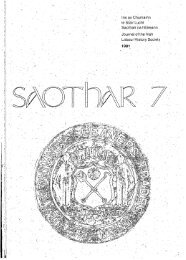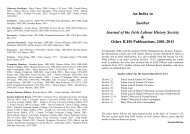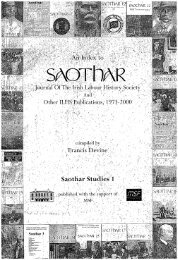44 SAOTHAR 13Annual Report, 1931, pp. 80-82.54. Irish Citizen, January, 1920; see also February 1920 issue.55. Undated letter of Helena Molony to Hanna Sheehy-Skeffmgton in SS Papers: Ms 22,687i; IWWU, AnnualReport, 1920.56. IWWU, Annual Report, 1948.57. Irish Citizen, 7 February, 1914; Irish Citizen, 11 October, 1913.58. Fox, op.cit., p.21.59. IWWU, Annual Report, 1948.60. 6 April, 1945; see also Fox, op.cit., pp. 26-27.61. IWWU, Annual Report, 1948.62. Joseph Lee, 'Aspects of Corporatist Thought in Ireland: The Commission on Vocational Organisation, 1939-43', in Art Cos grove and Donal McCartney, eds., Studies in Irish History, (Dublin, 1979), pp. 324-346.63. Miss Bennett and Senator Campbell, 'Reservation No. l' of the Report o/the Commission on VocationalOrganisation, 1943, p. 477.64. ibid., also see ITUC, Annual Report, 1935, p. 121; ITUC, Annual Report, 1936, pp. 128-29; .IWWU, AnnualReport, 1938.65. Cf. Bennett, in ITUC, Annual Report, 1942, p. 164; Lee, op.cit., p.344.66. ITUC, Annual Report, 1924.67. Terence Brown, Ireland: A Social and Cultural History, 1922-79, (London, 1981), pp. 160-1; Joseph A.MacMahon, 'The Catholic Clergy and the Social Question in Ireland, 1891-1916', Studies, vol. 70, winter1981, pp. 263-288.68. Bennett and Campbell, 'Reservation No. 1', p. 477.69. IWWU, Annual Report, 1924.70. IWWU, Annual Report, 1924; in 1949-50, Bennett was instrumental in the formation of the Lower PricesCouncil, a producer-consumer market, that soughtto keep down prices. It lasted 3-4 years. See Seamus Cody,John O'Dowd and Peter Rigney, The Parliament o/Labour: 100 Yearso/the Dublin Council o/Trade Unions(Dublin, 1986), pp. 190-93.71. IWWU, Annual Report, 1948, pp. 312f.72. ITUC, Annual Report, 1948, p. 191.73. Presidential Address, ITUC, Annual Report, 1948,p. 92.74.' Bennett, 'Jane Addams on the Sanctity of Life', Irish Citizen, 18 December, 1915.75. See Fox, op.cit., pp. 105, 109.76. Bennett, 'Direct Action' ,Irish Citizen, July/August, 1920.77. Gaughan, op.cit., pp. 377-9.78. ITUC, Annual Report, 1945, pp. 123-25; see also ITUC, Annual Report, 1946, p. 162.79. Ruaidhri Roberts and R. Dardis Clarke, The Story o/the Peoples College (Dublin, 1986).80. Owens, op.cit., p. 126.81. Fox, op.cit., pp. 66-67.82. MaiClifford, 'They gaveus one week butwe wantedtwo',LabourHistory News, Autumn 1986,p.12; SeamusCody, John O'Dowd and Peter Rigney, op.cit., pp. 178-182.83. See Clifford, op.cit.,.84. IWWU letter to Irish Times, undated; also see Margaret Ward, Unmanageable Revolutionaries (London;1983), p. 242. See also, Mary E. Daly, 'Women in the Irish Workforce', op.cit., pp. 78-9.85. Mary Cullen, 'How radical was Irish feminism', op.cit., p. 186.-86. Harriet Taylor Mill, 'Enfranchisement of Women ' in Alice S. Rossi, ed.,lohn Stuart Mill and Harriet TaylorMill: Essays on Sex Equality, (Chicago, 1970), p. 101.87. ILP&TUC Annual Report, 1924, p. 39; Leader column, Woman Worker, December, 1926.88. Gaughan, Johnson, pp. 307, 310; also ILP&TUC Annual Report, 1928, p. 89.89. SeeILP&TUCAnnualReport, 1922,pp. 78-79; ILP&TUCAnnualReport, 1924,pp. 140-141; IWWUAnnualReport, 1924; ILP&TUC Special Conference Report, 1930, p. 137.
Essays in ReviewCosherers, Wanderers and Vagabonds: The Treatment of thePoor and the Insane in IrelandHelen Burke,The People and the Poor Law in Nineteenth Century Ireland, (Women's EducationBureau, Dublin, 1987), pp. xiv & 369, £14.95 softbackJoseph Robins, Fools and Mad:A History of the Insane in Ireland, (Institute of Public Administration,Dublin, 1986), pp. 256, £14.95 hardbackFew facts are as well established in history as that the Irish were poverty-stricken in the eighteenthand nineteenth centuries. So apparently pervasive and widespread was the problem that the socialattitude (it was too early for such a word as 'policy') of successive Irish and British governments toIreland was defined very largely in terms of poverty and its relief. The impressionistic accounts ofArthur Young and other quasi-tourists of the late Georgian era gave way to the more statistic-basedresponse of the parliamentary enquiries as passive perception led to active concern. But theinterpretation by modem historians of Irish poverty in Georgian and Victorian times has mirrored theperceptions (and occasionally the attitudes) of those who assembled the original evidence. So clearand so voluble was the exposition of the facts that few, if any, historians have ever questioned themotives which underlay their assemblage or the manner and timing of their presentation. l The causesof Irish poverty were assiduously sought by concerned contemporaries, but no enquiry has yet exploredthe definition of poverty in its Irish context nor the extent to which it was identified and measured inrelation to British poverty or the prevailing concept thereof.Attempts at the control and regulation of poverty began in England with the parliamentary measureof 1601, a brave effort to both amalgamate and rationalise a plethora of local practices and earliermeasures. The 'old poor law' naturally reflected the needs and preferences of Englishmen as well asthe social and political environment in which Englishmen lived. The failure to apply the provisions ofthe 1601 act to Ireland was rooted, likewise, in Irish political realities. Any extension of Englishlegislation to Ireland depended on the degree to which it could be enforced. The few Irish statutespassed during the first half of the seventeenth century which could be said to relate to poverty revealprimarily the incompleteness of the conquest; but the various factors referred to therein as 'causes' ofpoverty had a significant effect on later developments. Irish ignorance of English agricultural practiceswas at the centre of the 1634 act 'to prevent the unprofitable custom of burning corn in the straw'.Allegedly, 'iII-husbandrie and improvident care' by native Irish farmers had led to an annual 'greatdearth of cattle'. That the negligence in question stemmed from 'a natural lazie disposition' and wastherefore categorically criminal is clear from the act's determination to punish rather than relieve theperpetrators, who were also of course the victims. Cure rather than prevention was also the focal pointof an act of the same year for 'the suppressing of cosherers and idle wanderers'. The ancient Irishpractice of coshering (the custom of claiming legitimate dues and of asserting the system of deference)was interpreted in the act as a type of banditry conducted by men who 'live idly and inordinately'. Menrecognised locally as legitimate chiefs of tuatha were equated with the lawless and problematic youngersons who roamed England in the generation before the Civil War. However inaccurate the designation,crime as well as improvident farming practices were identified at an early stage as prominent causesof poverty in Ireland.Crime was to remain a permanent feature of the British attitude to Irish poverty even into thetwentieth century. From the eighteenth century onwards education schemes, successful and otherwise,replaced punishment as a general remedy. But throughout the early modern period the continuingpolitical strife, together with the lack of control over 'remote' or Gaelic areas, retarded the absorption45
- Page 1 and 2: JOURNAL OF THE IRISH LABOUR HISTORY
- Page 3 and 4: ContentsPageEditorial: Labour Histo
- Page 5 and 6: EDITORIAL 3freedom to participate i
- Page 7 and 8: CorrespondenceThe Irish Labour Part
- Page 9 and 10: ; ~ ; ,The Decline and Fall of Donn
- Page 11 and 12: THE DECLINE AND FALL OF DONNYBROOK
- Page 13 and 14: THE DECLINE AND FALL OF DONNYBROOK
- Page 15 and 16: ·' THE DECLINE AND FALL OF DONNYBR
- Page 17 and 18: THE DECLINE AND FALL OF DONNYBROOK
- Page 19 and 20: THE DECLINE AND FALL OF DONNYBROOK
- Page 21 and 22: THE DECLINE AND FALL OF DONNYBROOK
- Page 23 and 24: THE DECLINE AND FALL OF DONNYBROOK
- Page 25 and 26: ,'-,;-''''.A PASSAGE TO BRITAIN 23C
- Page 27 and 28: A PASSAGE TO BRITAIN 25only in the
- Page 29 and 30: A PASSAGE TO BRITAIN 27clothing._De
- Page 31 and 32: A PASSAGE TO BRITAIN 29established
- Page 33 and 34: ;:-.",.- .. .", ...... '.:. '
- Page 35 and 36: LOUIE BENNETI 33feminist movement w
- Page 37 and 38: :... ~: ."
- Page 39 and 40: -.- '.LOUlE BENNETT 37While there i
- Page 41 and 42: LOUIE ~ENNEIT 39Xl's encyclical Qua
- Page 43 and 44: LOUIE BENNEIT 41Bennett's own relat
- Page 45: LODIE BENNETT 43109; IWWU resolutio
- Page 49 and 50: ••• .".'. >. '~"ESSA YS IN RE
- Page 51 and 52: ESSAYS IN REVIEW 49ConnolIy:Myth an
- Page 53 and 54: ESSAYS IN ~EVIEW 51tion' in the Int
- Page 55 and 56: ESSAYS IN REVIEW53International:'I
- Page 57 and 58: REVIEWScontroversy is real history.
- Page 59 and 60: REVIEWSJoe Monks was among the earl
- Page 61 and 62: REVIEWSnolly-Column Song','Proudly
- Page 63 and 64: REVIEWSresulting from the arrival o
- Page 65 and 66: REVIEWS,63the book by means of an a
- Page 67 and 68: REVIEWSlogue, it is hardly surprisi
- Page 69 and 70: The Team For All Workers ...CULIAIB
- Page 71 and 72: ESSAYS 69mission and moral refonn.l
- Page 73 and 74: .. ...... ~.~ -~ .'- '.ESSAYS. 71fr
- Page 75 and 76: ESSAYS 73claimed authority but whic
- Page 77 and 78: ESSAYS 75provided the basis for soc
- Page 79 and 80: ESSAYS 779. For comparisons see E.T
- Page 81 and 82: ESSAYS 7952. Annals of Christ Churc
- Page 83 and 84: ESSAYS' 81Fianna Fail and the Worki
- Page 85 and 86: ESSAYS 83Eireann in 1925 visibly di
- Page 87 and 88: ESSAYS 85recognition of the impract
- Page 89 and 90: ESSAYS 871970, it created the condi
- Page 91 and 92: ESSAYS89The Irish Immigrants' Contr
- Page 93 and 94: ESSAYS" 91Although anti -Catholic p
- Page 95 and 96: ESSAYS 93McCowie played a key role
- Page 97 and 98:
:. -,,'.' ',. .~.,:.ESSAYS 95Althou
- Page 99 and 100:
ESSAYS 97young girl of their own ba
- Page 101 and 102:
SourcesIrish Labour History Society
- Page 103 and 104:
SOURCES 101INovember, 1971 to no. 1
- Page 105 and 106:
SOURCES 103would claim credit for t
- Page 107 and 108:
SOURCES105Sources for Irish Labour
- Page 109 and 110:
SOURCES 107NorthWest Archives and L
- Page 111 and 112:
SOURCES 109In 1966 the Finnish gove
- Page 113 and 114:
TURNINGANEWLEAFThe CPSSUis the larg
- Page 115 and 116:
REMINISCENCE 113us due to my politi
- Page 117 and 118:
REMINISCENCE 115when Jim was presen
- Page 119 and 120:
REMINISCENCE 117of Dail Eireann. 17
- Page 121 and 122:
REMINISCENCE 119NotesThe above arti
- Page 123 and 124:
DOCUMENT STUDY 121James Connolly in
- Page 125 and 126:
DOCUMENT STUDY123SOCIAL DEMOCRATIC
- Page 127 and 128:
DOCUMENT STUDY 125proletariat of th
- Page 129 and 130:
DOCUMENT STUDY 127the support of Je
- Page 131 and 132:
DOCUMENT STUDY 12926. The Workers'
- Page 133 and 134:
131BibliographyA Bibliography of Ir
- Page 135 and 136:
BIBLIOGRAPHY 133Compton, P.A. Demog
- Page 137 and 138:
BIBLIOGRAPHY 135Levine, I. and Madd
- Page 139 and 140:
BIBLIOGRAPHY 137Turner, M. 'Towards
- Page 141 and 142:
BIBLIOGRAPHY 1394. Land and Agricul
- Page 143 and 144:
BIBLIOGRAPHY 141Clogher Record12 (2
- Page 145 and 146:
BIBLIOGRAPHY 143Political Research
- Page 147 and 148:
BIBLIOGRAPHY 145Pres, 1987.O'Brien,
- Page 149 and 150:
147Notes on Contributorsf onathanBe
- Page 151 and 152:
1901: Ireland's first general union
- Page 153 and 154:
ELECTRICAL TRADES UNION .Establishe





